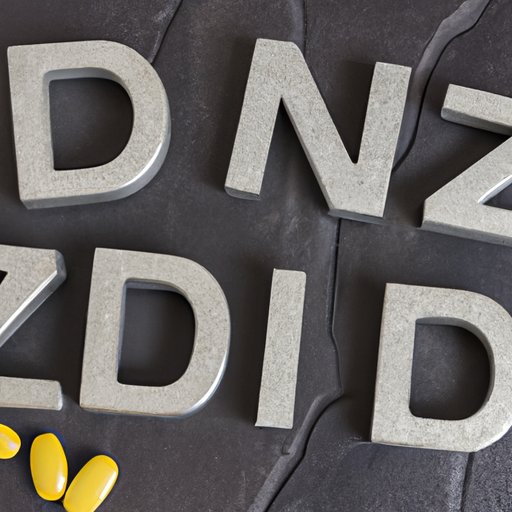
I. Introduction
If you’re looking to boost your immune system, chances are you’ve considered taking supplements such as zinc and vitamin D. But can you take them together?
In this article, we’ll explore the benefits and precautions of combining zinc and vitamin D supplements. You’ll learn the optimal dosage, timing, and type of supplement to take for each nutrient. Plus, we’ll be discussing the scientific studies that support the combination of these supplements, as well as the latest expert opinions on the topic.
By the end of this article, you’ll have a comprehensive guide to better health and wellness.
II. Boosting Your Immune System: The Benefits and Precautions of Combining Zinc and Vitamin D Supplements
Zinc and vitamin D play a crucial role in boosting the immune system. Zinc is important for the production and function of immune cells, while vitamin D helps regulate the immune system’s response to infections.
Individually, zinc has been shown to reduce the severity and duration of colds, while vitamin D has been linked to a lower risk of respiratory infections.
However, combining supplements can have potential side effects and negative interactions. For example, taking too much zinc can interfere with the absorption of copper and iron, while taking too much vitamin D can lead to kidney damage.
It’s important to consult with a healthcare professional before starting a supplement regimen, especially if you’re taking medications or have health conditions that may interact with these supplements.
III. Stacking Zinc and Vitamin D: When and How to Take These Essential Supplements Hand-in-Hand
The optimal dosage and frequency for taking zinc and vitamin D together can vary depending on your age, sex, and other factors.
However, a general guideline is to take no more than 40mg of zinc per day and no more than 4000IU of vitamin D per day.
The timing of taking these supplements can also make a difference. It’s generally recommended to take zinc with food to reduce the risk of stomach upset. Vitamin D, on the other hand, is best absorbed when taken with a meal that contains fat.
When it comes to choosing the right type of supplement for each nutrient, there are many options available. Zinc can be taken in the form of tablets, capsules, or lozenges, while vitamin D can be found in tablets, capsules, or drops.
IV. The Secret Weapon for Optimal Health: Understanding the Science behind Zinc and Vitamin D Combination
Zinc and vitamin D work together to provide health benefits such as supporting the immune system, promoting bone health, and reducing inflammation.
Studies have shown that combining zinc and vitamin D can enhance their individual benefits. For example, one study found that taking zinc and vitamin D supplements together reduced the risk of infections in older adults.
The combination of these supplements may be especially beneficial for certain health conditions or populations. For instance, individuals with low vitamin D levels may benefit from taking zinc and vitamin D together to boost their immune function.
V. Zinc and Vitamin D: A Comprehensive Guide to Better Health and Wellness
When it comes to taking zinc and vitamin D supplements, it’s important to consider the dosage, timing, and type of supplement. It’s also important to consult with a healthcare professional before starting a supplement regimen.
In addition to taking supplements, there are other ways to optimize your health and wellness. Eating a balanced diet, exercising regularly, and getting enough sleep are all important for supporting the immune system and overall well-being.
VI. The Dos and Don’ts of Combining Zinc and Vitamin D Supplements: A Review of Latest Expert Opinions
Experts generally agree that taking zinc and vitamin D supplements together can be beneficial for overall health and wellness.
However, it’s important to follow the recommended dosage and consult with a healthcare professional before starting a supplement regimen.
It’s also important to be aware of any potential interactions or side effects. For example, taking high doses of zinc can cause nausea and vomiting, while taking too much vitamin D can cause fatigue and weakness.
VII. Conclusion
Zinc and vitamin D are essential nutrients for boosting the immune system and promoting overall health and wellness.
By understanding the benefits and precautions of combining these supplements, you can take control of your health and well-being.
Remember to consult with a healthcare professional before starting a supplement regimen, and to follow the recommended dosage and timing for each nutrient.




